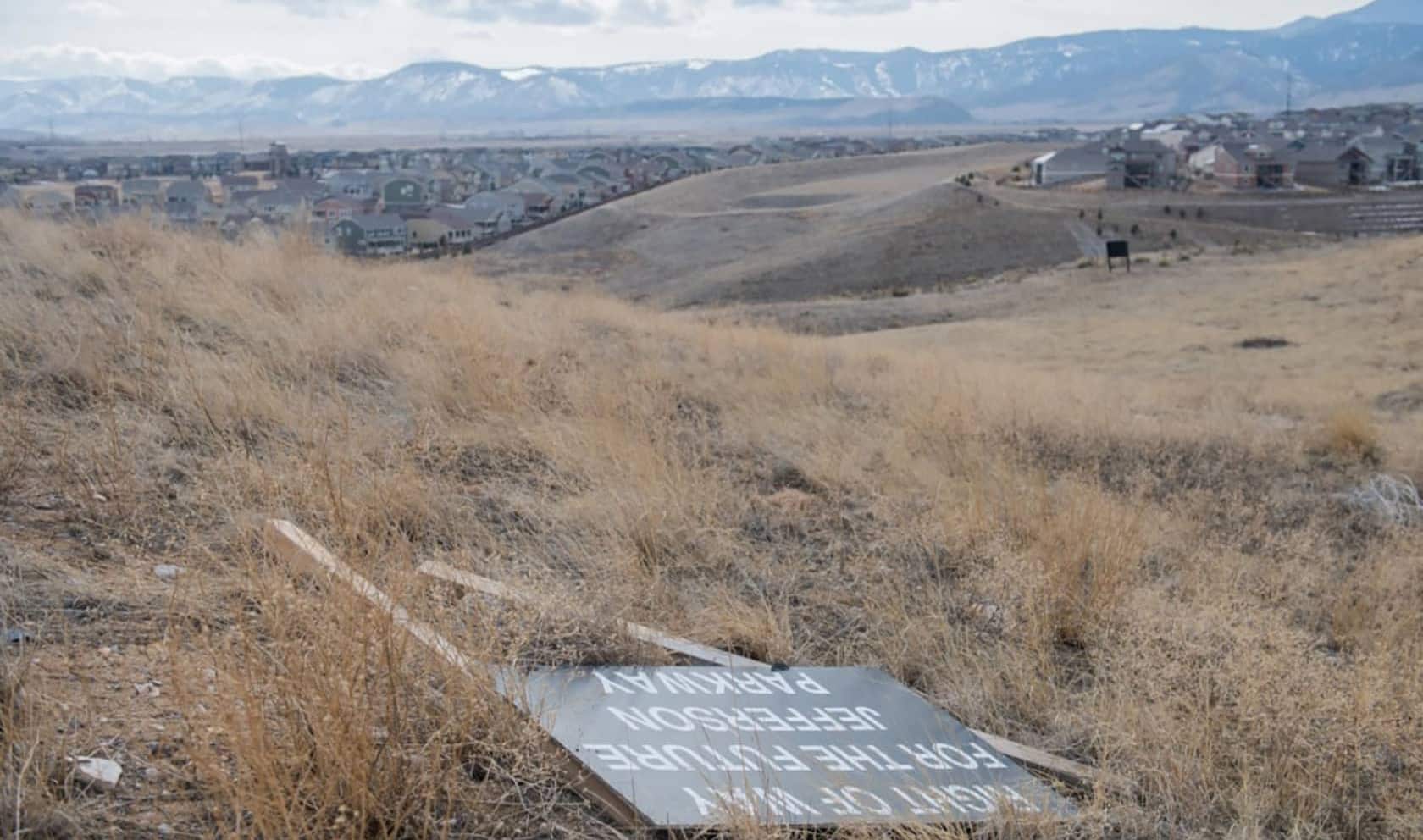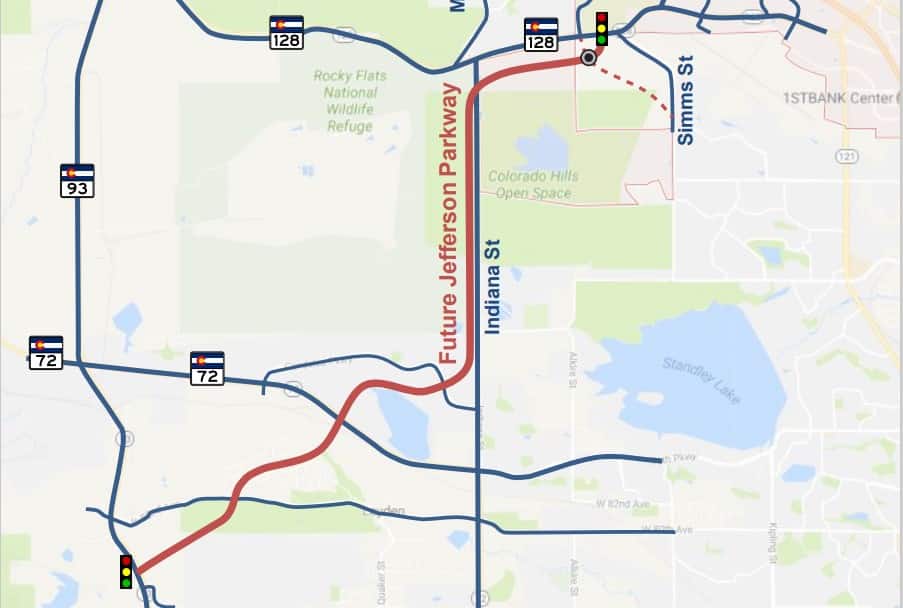
The history of the Jefferson Parkway is long and fraught. (Photo by Daniel Brenner/Special to the Denver Post)
Broomfield is pushing back against claims that it tanked the long-delayed Jefferson Parkway highway project and is questioning whether that project was viable.
On June 1, the City and County of Broomfield was sued by the City of Arvada and Jefferson County. The plaintiffs accuse Broomfield of breaching a 2010 contract to build the 10-mile, four-lane, $250 million parkway connecting Broomfield and Golden.
“Broomfield’s actions throw the future of the Jefferson Parkway into disarray,” that lawsuit stated, “and leave Arvada and Jefferson County no way to recoup the millions of dollars in taxpayer contributions that have been expended on the project to date.”
Broomfield filed its response to that lawsuit last week. It defended a decision by the Broomfield City Council in 2020 to leave the Jefferson Parkway Public Highway Authority, or JPPHA. That entity was created in 2008 to coordinate construction of the highway.
The council did so because of elevated plutonium readings in the path of the parkway, which would run adjacent to the former Rocky Flats nuclear weapons plant.
“There is nothing limiting a governmental entity from determining that any risk of plutonium contamination, even a small one, is too much to tolerate for the parkway,” Deputy City and County Attorney Patricia Gilbert wrote Sept. 22.
Gilbert is asking a Jefferson County District Court judge to dismiss the lawsuit by Arvada and Jefferson County. She said allegations in the lawsuit “assume that the Jefferson Parkway is a viable project” when there are reasons for doubt: an economic downturn that cut tax revenue, changes in local government leadership, and residents’ complaints.
“There continues to be environmental concerns and public opposition to the parkway,” Gilbert wrote, citing a Denver Post article that mentions the plutonium problem and criticisms “from Arvada residents who don’t want a highway running through their neighborhoods.”

The four-lane Jefferson Parkway would connect Highway 128 in Broomfield with Highway 93 about 10 miles southwest of there in Golden. (Courtesy of the Jefferson Parkway Public Highway Authority)
Gilbert says the JPPHA hasn’t met for more than two and a half years, which further “calls into question the viability of both the Jefferson Parkway and the (JPPHA) itself. No progress has been made in financing or constructing the parkway during this time.”
“Until JPPHA’s board meets, the parkway project cannot proceed. If the project is not viable for reasons other than Broomfield’s alleged failures to provide money and right of way, then there would be no basis for JPPHA to demand payment or right of way from Broomfield.”
Bill Ray, executive director of the JPPHA, defended the project’s viability in an interview Tuesday and said the board hasn’t met because Broomfield left the JPPHA. The highway authority must now await a resolution to the legal matter, he said.
“The authority is a creation of the three originating jurisdictions and they’re all having their dispute among themselves about who’s responsible for what,” Ray said. “The authority is not in a position to move forward until that is resolved in some way.”
The history of the proposed Jefferson Parkway is long and fraught. The idea of a beltway loop around Denver dates to the late 1960s and rights of way for the Jefferson Parkway were set aside by Congress in 2001 when it created the Rocky Flats National Wildlife Refuge.
Agreements in 2008 and 2010 established the partnership between Jefferson County, Arvada and Broomfield. Environmentalists and the town of Superior fought the matter in federal court in 2012, and won temporary victories but ultimately couldn’t stop the project.
According to the June lawsuit, Arvada taxpayers have contributed $6.9 million to the project, other Jefferson County taxpayers have contributed $6.3 million and Broomfield taxpayers $3.5 million. The plan is for that money to be recouped via tolls on the parkway, but that can’t happen if the Jefferson Parkway is never built.
Through a spokeswoman, Jefferson County and its attorneys declined to comment on Broomfield’s claims. Arvada and its attorneys did not respond to a request for comment.

The history of the Jefferson Parkway is long and fraught. (Photo by Daniel Brenner/Special to the Denver Post)
Broomfield is pushing back against claims that it tanked the long-delayed Jefferson Parkway highway project and is questioning whether that project was viable.
On June 1, the City and County of Broomfield was sued by the City of Arvada and Jefferson County. The plaintiffs accuse Broomfield of breaching a 2010 contract to build the 10-mile, four-lane, $250 million parkway connecting Broomfield and Golden.
“Broomfield’s actions throw the future of the Jefferson Parkway into disarray,” that lawsuit stated, “and leave Arvada and Jefferson County no way to recoup the millions of dollars in taxpayer contributions that have been expended on the project to date.”
Broomfield filed its response to that lawsuit last week. It defended a decision by the Broomfield City Council in 2020 to leave the Jefferson Parkway Public Highway Authority, or JPPHA. That entity was created in 2008 to coordinate construction of the highway.
The council did so because of elevated plutonium readings in the path of the parkway, which would run adjacent to the former Rocky Flats nuclear weapons plant.
“There is nothing limiting a governmental entity from determining that any risk of plutonium contamination, even a small one, is too much to tolerate for the parkway,” Deputy City and County Attorney Patricia Gilbert wrote Sept. 22.
Gilbert is asking a Jefferson County District Court judge to dismiss the lawsuit by Arvada and Jefferson County. She said allegations in the lawsuit “assume that the Jefferson Parkway is a viable project” when there are reasons for doubt: an economic downturn that cut tax revenue, changes in local government leadership, and residents’ complaints.
“There continues to be environmental concerns and public opposition to the parkway,” Gilbert wrote, citing a Denver Post article that mentions the plutonium problem and criticisms “from Arvada residents who don’t want a highway running through their neighborhoods.”

The four-lane Jefferson Parkway would connect Highway 128 in Broomfield with Highway 93 about 10 miles southwest of there in Golden. (Courtesy of the Jefferson Parkway Public Highway Authority)
Gilbert says the JPPHA hasn’t met for more than two and a half years, which further “calls into question the viability of both the Jefferson Parkway and the (JPPHA) itself. No progress has been made in financing or constructing the parkway during this time.”
“Until JPPHA’s board meets, the parkway project cannot proceed. If the project is not viable for reasons other than Broomfield’s alleged failures to provide money and right of way, then there would be no basis for JPPHA to demand payment or right of way from Broomfield.”
Bill Ray, executive director of the JPPHA, defended the project’s viability in an interview Tuesday and said the board hasn’t met because Broomfield left the JPPHA. The highway authority must now await a resolution to the legal matter, he said.
“The authority is a creation of the three originating jurisdictions and they’re all having their dispute among themselves about who’s responsible for what,” Ray said. “The authority is not in a position to move forward until that is resolved in some way.”
The history of the proposed Jefferson Parkway is long and fraught. The idea of a beltway loop around Denver dates to the late 1960s and rights of way for the Jefferson Parkway were set aside by Congress in 2001 when it created the Rocky Flats National Wildlife Refuge.
Agreements in 2008 and 2010 established the partnership between Jefferson County, Arvada and Broomfield. Environmentalists and the town of Superior fought the matter in federal court in 2012, and won temporary victories but ultimately couldn’t stop the project.
According to the June lawsuit, Arvada taxpayers have contributed $6.9 million to the project, other Jefferson County taxpayers have contributed $6.3 million and Broomfield taxpayers $3.5 million. The plan is for that money to be recouped via tolls on the parkway, but that can’t happen if the Jefferson Parkway is never built.
Through a spokeswoman, Jefferson County and its attorneys declined to comment on Broomfield’s claims. Arvada and its attorneys did not respond to a request for comment.
